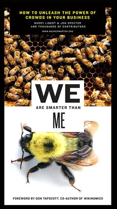 At our TechCrunch Boston MeetUp, a company is launching called Mzinga that brings white-label social networks to consumer research. Mzinga, which means “beehive” in Swahili, is actually the combination and rebranding of two existing companies: Knowledge Planet (Web-based corporate learning) and Shared Insights (Web communities). Right out of the gate, the company already has a healthy business with $17 million in annual revenues and 100 employees. And CEO Rick Faulk says the company is “nearly profitable.”
At our TechCrunch Boston MeetUp, a company is launching called Mzinga that brings white-label social networks to consumer research. Mzinga, which means “beehive” in Swahili, is actually the combination and rebranding of two existing companies: Knowledge Planet (Web-based corporate learning) and Shared Insights (Web communities). Right out of the gate, the company already has a healthy business with $17 million in annual revenues and 100 employees. And CEO Rick Faulk says the company is “nearly profitable.”
Mzinga lets corporations create social networks for their most ardent customers or alumni and retirees. It offers a menu of social modules that companies can add to their sites, including blogs, wikis, surveys, polls, calendars, forums, tag clouds, file uploading tools, individual profile pages, group pages, and idea-management tools with Digg-like voting. Faulk used to be the chief marketing officer at WebEx, and Mziinga already powers the community portion of its site. WebEx’s most hardcore customers can join and give feedback there about future features that WebEx should implementing.
This must be the month that social networks go corporate because last week another white-label social network launched called Networked Insights. Like Mzinga, it lets companies create a place on their sites where customers can hang out and talk about their products. But it uses semantic analysis and concept matching to extract meaning from all the chatter, and ranks conversations or comments based on how many interactions are associated with it. So a loud, whiny customer who complains a lot about a product in comments, but nobody else is joining in or linking off him, counts less than the quiet customer who only made one insightful post that spurred a torrent of other comments, links, ratings, and invitations to others to join the discussion.
Of course, being able to capture all of these discussions and mine them for meaning make them potentially more powerful than any focus group. The trick will be to get a representative sample of a company’s customers to participate, as opposed to just the most opinionated or the ones who are already brand fanatics.
 Corporate social networks may not be sexy, but they could be a goldmine. Networked Insights charges $200,000 a year and up to build a social network for your brand (pricing is based on the number of interactions). Mzinga will charge $1,000 a month for its self-serve offerings and $15,000 a month for full service (or $180,000 per year), where Mzinga builds the site, then recruits, and manages the community. Faulk is finding plenty of takers for the more expensive option. “What we are finding is that companies like to write a check to make it successful,” he says, sounding a bit like someone who cannot believe his own luck.
Corporate social networks may not be sexy, but they could be a goldmine. Networked Insights charges $200,000 a year and up to build a social network for your brand (pricing is based on the number of interactions). Mzinga will charge $1,000 a month for its self-serve offerings and $15,000 a month for full service (or $180,000 per year), where Mzinga builds the site, then recruits, and manages the community. Faulk is finding plenty of takers for the more expensive option. “What we are finding is that companies like to write a check to make it successful,” he says, sounding a bit like someone who cannot believe his own luck.
Faulk is also taking a social approach to marketing. Mzinga’s software was used to create a site for the express purpose of crowdsourcing a book. The book, We Are Smarter Than Me, was written by 5,000 different people and published by Wharton. It was released on September 24th, and already the first print run of 15,000 is nearly sold out, says Faulk. The book is about—what else—how to use crowds to help your business.